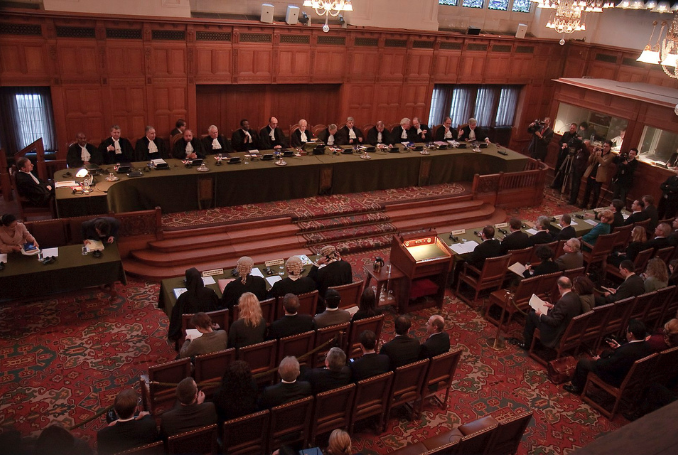
This represents a clear blow to the credibility of Israel’s key claims about its “territorial integrity” and its “rights” under international law.
On July 19, the International Court of Justice (ICJ) unanimously adopted an advisory opinion on the ‘legal consequences arising from the policies and practices of Israel in the occupied Palestinian territory, including East Jerusalem’.
The verdict was guilty on all accounts, leading to a fear that a number of actions could be taken by states against the Israeli government as a result.
In 2004, the ICJ issued a similar advisory opinion, specifically on the issue of Israel’s separation wall that it had been constructing inside the occupied West Bank.
However, in order to render the judgment that the wall was indeed illegal, it first needed to establish whether the other policies of Israel, inside what is called the occupied Palestinian territories (oPt), were legal too.
This included the questions of Israel’s illegal settlements and other key issues, all of which were ruled illegal under international law unanimously by the World Court at the time.
The recent judgment rendered by the court in its advisory opinion, which was requested by the ‘UN Independent International Commission of Inquiry on the Occupied Palestinian Territory, including East Jerusalem’.
This came following a vote in the UN’s General Assembly which approved the view reflected in the independent international commission’s report on the issue and called for an ICJ advisory opinion to follow it up. The UN commission called the ICJ ruling historic and welcomed the findings as significant.
On the transfer of civilian population into occupied territory, confiscation or requisitioning of land, exploitation of natural resources, extension of Israeli law, forced displacement of the Palestinian population and violence against Palestinians, the ICJ found Israel to have violated international law.
On settlement expansion in the occupied Palestinian territories (oPt), the ICJ ruled in favor of reaffirming the 2004 advisory opinion it issued, which stated that the illegal settlements have violated international law. It also went on to state the following:
“The Court notes with grave concern reports that Israel’s settlement policy has been expanding since the Court’s Wall Advisory Opinion. In particular, in December 2022 Israel’s parliament approved the establishment of an additional minister within the Ministry of Defence vested with governing powers in the West Bank, including land designations, planning and co-ordination of demolitions, which would expedite the approval process for new settlements. Also, the size of existing Israeli settlements expanded from 1 November 2022 to 31 October 2023 at a significant rate, with approximately 24,300 housing units within existing Israeli settlements in the West Bank being advanced or approved, including approximately 9,670 in East Jerusalem”.
Finding Israel in violation of illegally annexing Palestinian territory, the advisory opinion concluded the following:
“In light of the above, the Court is of the view that Israel’s policies and practices, including the maintenance and expansion of settlements, the construction of associated infrastructure, including the wall, the exploitation of natural resources, the proclamation of Jerusalem as Israel’s capital, the comprehensive application of Israeli domestic law in East Jerusalem and its extensive application in the West Bank, entrench Israel’s control of the Occupied Palestinian Territory, notably of East Jerusalem and of Area C of the West Bank. These policies and practices are designed to remain in place indefinitely and to create irreversible effects on the ground. Consequently, the Court considers that these policies and practices amount to annexation of large parts of the Occupied Palestinian Territory.”
The court also affirmed that Israel is illegally occupying the oPt and must withdraw, but that until that time it is still bound by its obligations to the population it occupies under international law. In its Legal Consequences for Israel segment it also states that the Israeli government is now bound to pay Palestinians reparations for its crimes against them, including restitution, elaborating on this point to say the following:
“Restitution includes Israel’s obligation to return the land and other immovable property, as well as all assets seized from any natural or legal person since its occupation started in 1967, and all cultural property and assets taken from Palestinians and Palestinian institutions, including archives and documents. It also requires the evacuation of all settlers from existing settlements and the dismantling of the parts of the wall constructed by Israel that are situated in the Occupied Palestinian Territory, as well as allowing all Palestinians displaced during the occupation to return to their original place of residence.”
The ICJ also concluded that the violations of international law committed by Israel are “the concern of all States”, which has triggered anxiety amongst Zionists who fear action from more States around the world, following the court’s advisory opinion. There also appears to now be more pressure placed upon the International Criminal Court (ICC) to issue arrest warrants for Israeli Prime Minister Benjamin Netanyahu and his Defence Minister Yoav Gallant, as called for by the ICC’s chief prosecutor Karim Khan.
There may not be immediate action taken that ends Israel’s violations of international law and it is clear that Tel Aviv has simply rejected the advisory opinion, as it did 2004’s advisory opinion.
Yet, this represents a clear blow to the credibility of Israel’s key claims about its “territorial integrity” and its “rights” under international law.
(The Palestine Chronicle)

– Robert Inlakesh is a journalist, writer, and documentary filmmaker. He focuses on the Middle East, specializing in Palestine. He contributed this article to The Palestine Chronicle.








The important thing is that Israel’s credibility has gone down the gurgler. Israel can now be talked about as relying on people’s credulity, not its own credibility. If you want to make an impact on Netanyahu’s speech before the US Congress, you might like to point that out to the US Representatives in Congress assembled – “that Netanyahu relies on your gullibility”.